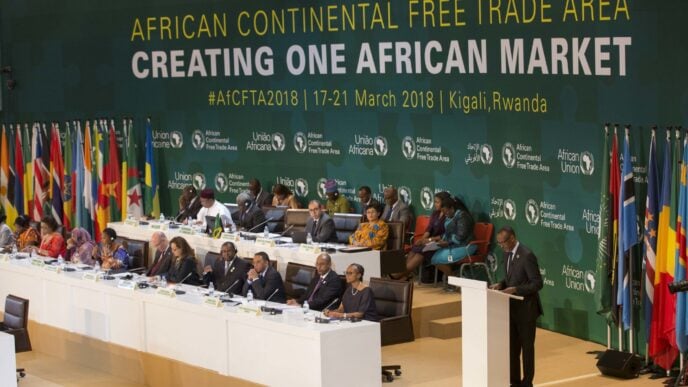The very question is: Are Africans genetically inferior? This is a question that has been asked many times over the years and throughout history. To answer it, you need to know both the science of genetics and the history of these kinds of assertions. First, it’s vital to know that the notion of genetic inferiority comes from eugenics, a controversial field that started in the late 1800s and early 1900s.
Eugenics was based on the idea that some genetic features may be passed on to make people better, while others, called “undesirable,” should be stopped or gotten rid of. In my opinion, eugenics could simply be referred to as human genetic mutilation or selective breeding to improve genetic quality to derive a desired outcome from procreation. However, efforts to “improve” people through selective breeding are unethical and unscientific. So, eugenics is now widely condemned by scientists, ethicists, and governments.
During this time, racial superiority theories were widely promoted, especially in Western countries, with some arguing that people of African descent were inherently inferior in comparison to people of European descent. These theories were often based on misinterpretations of scientific findings, rather than objective or reliable evidence. Over time, the theory of racial genetic inferiority has been discredited by scientists, and modern genetics has proven that there is no inherent genetic difference in intelligence, abilities, or worth between races.
In fact, Africa is often referred to as the “Cradle of Humanity,” as the continent is believed to be the origin of the human species. The genetic diversity within African populations is the highest in the world, meaning that Africa has a rich genetic heritage. Many of the world’s greatest achievements in science, technology, art, and culture have been contributed by Africans, both on the continent and globally. Africans have proven time and again their resilience, creativity, and intellectual capacity.
Advertisement
Historically, the idea of African inferiority was used as a tool for colonisation and exploitation, as colonisers justified their control over African people by claiming they were “genetically inferior.” This false narrative has had long-lasting effects on the perception of African people, but it is not supported by any credible scientific evidence.
In fact, the human genetic material is 99.9% identical across all populations, meaning that any differences that do exist are minimal and do not support claims of racial superiority or inferiority. Therefore, differences in traits like intelligence or physical ability are not determined by race, but by a complex interplay of genetics, environment, upbringing, diet, education, and opportunity.
More so, intelligence is a multifaceted trait that any single factor cannot accurately measure, and it certainly cannot be linked to race. Differences in intelligence, behaviour, or success are not genetically determined by race. Unfortunately, the legacy of eugenics has had a lasting impact, particularly in how people of African descent are perceived and treated worldwide. These stereotypes still exist today, in both subtle and overt forms.
Advertisement
For instance, historical prejudices about African intellectual and physical abilities continue to shape certain attitudes and policies, often leading to systemic inequalities in education, employment, and healthcare. Throughout the continent, many Africans have made significant contributions to global culture, science, and politics.
For example, in Lagos, the tech startup scene has expanded rapidly in recent years, producing innovative solutions to problems such as poverty, healthcare, and education. Nigerian inventors, like the creator of the mobile banking platform Paga, are leading efforts to revolutionise how Africans access financial services. This example, along with others across the continent, proves that Africans are not “genetically inferior”; instead, they are resourceful, capable, and full of potential. In fact, the notion of genetic inferiority is not only scientifically flawed but also morally damaging, as it undermines the hard work and resilience of countless individuals who have defied the odds to succeed.
The key point to remember is that race has no inherent connection to intelligence, physical ability, or worth. Every person, regardless of their background, has the potential to achieve greatness. Instead of clinging to outdated and discredited ideas of genetic inferiority, the world should focus on promoting equality, providing access to resources, and celebrating the diversity within our global community. Africa’s history has been shaped by colonisation, exploitation, and division. These external forces were often justified by beliefs in racial superiority and the myth of African inferiority.
However, in recent decades, Africans have made substantial progress in overcoming these challenges, demonstrating that, when given the opportunity, they can excel in every field. In Lagos and other African cities, there is a growing sense of pride and determination. People are fighting for better education, healthcare, and infrastructure, showing that the idea of genetic inferiority is nothing more than a harmful myth. Ultimately, Africans are no more genetically inferior to any other group. The idea that one race or group is genetically superior to another is rooted in ignorance and lacks any scientific foundation.
Advertisement
As Africa continues to develop and make remarkable progress, it is clear that the continent and its people possess limitless potential. Therefore, it is time to discard these damaging stereotypes and focus on creating a world where everyone, regardless of background, has the chance to succeed. Africa is not merely a continent with challenges; it is a land of enormous potential, rich history, and remarkable resilience. The true value of any society lies in its diversity and its ability to uplift each individual to reach their highest potential. Moving forward, we must prioritise equality, celebrate diversity, and work together towards a world where opportunity is accessible to all. Good luck!
How may you obtain advice or further information on the article?
Dr. Timi Olubiyi is an expert in entrepreneurship and business management, with a Ph.D. in Business Administration from Babcock University in Nigeria. He is a prolific investment coach, author, columnist, and seasoned scholar. He can be reached through his Twitter handle @drtimiolubiyi and via email at [email protected]
Advertisement
Views expressed by contributors are strictly personal and not of TheCable.













